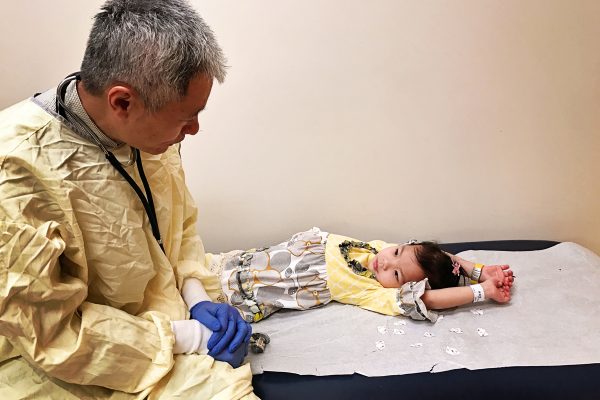When we arrived home with our youngest daughter and fourth CHD child, Rini, in August of 2013, my definition of a long hospital stay was three weeks. When my husband dropped us off at the entrance of the children’s hospital’s Emergency Department straight from the airport, little did I know that my definition of an extended hospital stay was about to change drastically.
Rini’s initial hospitalization turned into six months – with the first six weeks at a hospital one hour from home and the remainder at a hospital four hours from home. With five other children ages 13, 7, 5, 4, and 3, it was a taxing season in our lives.
There’s so much I learned during those months, but the following are points I would like to share for families who find themselves on the seemingly endless treadmill of an extended hospitalization with their child.
Make your child visible.
I’ll never forget my first morning in the Cardiac ICU at Seattle Children’s Hospital. We had been transported via Life Flight Northwest the night before from our local children’s hospital, where our daughter had been the only child in its Pediatric ICU with complex, let alone end-stage, cardiac disease. Now we were in a large CICU… a sea of CHD and Cardiomyopathy. Rini was just one of many intensely sick children at one of the largest pediatric heart failure/transplant programs in the country.
It dawned on me quickly that I needed to make sure that every medical professional in that unit knew her as an individual, not simply the end stage single ventricle in room 204.
So I spent the next 48 hours decorating the sliding glass door to her room with the photographs of her that I had brought with me, artwork from her siblings, cards sent to her by family and friends, her “This Is Me” poster from her previous hospital, and a large family photograph which I positioned directly above the slot on the wall outside of her room where her paperwork was kept. I didn’t want anyone walking by her room without knowing that there was a much loved human being residing just a few feet on the other side of the door.
Nurture relationships with your child’s medical team.
Making Rini visible greatly contributed to my ability to do this. The photographs of her and our family were conversation starters. Soon, physicians who were not even a part of her direct team were coming by to talk and learn about her. One such person was a general cardiologist who was intrigued by her story and stopped by every so often with questions about the status of CHD children in China. Long story short, he came on board with Little Hearts Medical and is now one of our most prolific file reviewers. He is also the cardiologist in charge of our non-transplant CHD children when they have interventions at the hospital.
We also built a friendship with Rini’s transplant cardiologist, who was born in a province neighboring hers in China. They share a beautiful bond. Those are but two examples of the fruit born of the many friendships established during those long, often heartbreaking, and yet miraculous months.

Rini and her transplant cardiologist, Dr. Yuk Law, at her transplant clinic visit last week
Rini has a team of caretakers there who know and love her and embrace our family, which has resulted in a holistic experience and has increased our confidence in the entirety of her care.
Treat your child’s medical team with respect. Practice grace.
During times of great stress, it can be tempting to lash out. While sounding an alarm in order to get your child what he/she needs in the medical setting is sometimes necessary, we all have the choice to do so with poise or without. In my experience, better results are yielded with honey than with vinegar. You can be a fierce advocate without resorting to hurling insults and demeaning others. And you will be a better advocate by restraining yourself from behaving in such a way, as very few people will feel compelled to go the extra mile for people that are abusive to them.
Remember that medicine is often as much of an art as a science, and that difficult recoveries and poor outcomes happen at even the most experienced and highly ranked of hospitals. Work with your child’s doctors and nurses, not against them.
Practice random acts of kindness.
There is no better pick-me-up than doing something kind for other parents and children who are suffering along with you and yours. Leaving a can of Diet Coke outside of the room of the child down the hall whose mother I knew was craving it; slipping some cash into an envelope for a meal for a family who was struggling financially; taking the sibling of the little boy on life support in the room next door to the playroom to give his mother a respite…all of these acts ultimately fed my soul and allowed me to pull myself inside out. Providing balance for your spirit during the darkest of times is vital.
Reach out to other parents in the hospital.
I was mentored by two women whose children had spent almost a year in the hospital; one waiting for transplant and the other in a vicious post-transplant recovery. What I learned from them, both spiritually and pragmatically, was priceless. As the weeks and months passed, all we needed to do was look at each other to know what to say, or when to remain silent.
Sharing our cumulative wisdom with the families who would appear in the unit, some shell-shocked as they had just been thrust into the world of CHD, was like balm to my soul. I found that supporting others was soothing, empowering, and ultimately healing.
Take care of your physical self.
A daily trek outdoors for exercise and above all, providing yourself with good nutrition, is essential for body and mind. It is very easy to fall into the habit of endless candy eating and sugar-loaded lattes in the hospital setting when under tremendous stress (I am guilty as charged). And while there is a place for treating yourself, treating yourself right should take priority.
Ask for help.
Whether reaching out to other adoptive parents, hospital social workers, or mental health professionals, be sure to create a network of care around yourself even if you don’t feel that you need it right in that moment.
Also, be sure to notify your other children’s pediatricians and teachers of the stress your family is under. They may have resources for you to take advantage of to assist everyone in your family when times are challenging.
Remember to cry.
I failed miserably at this. In my attempt to keep myself together, I neglected to acknowledge my grief.
It took me a long time to understand that my gratitude for the blessings of each day could coexist with the pain and grief of my child’s very uncertain tomorrow.
Now, three years out from Rini’s transplant, I am finally able to cry all the tears I wouldn’t permit myself to while in the thick of the trauma. I had forgotten that tears can be another voice with which to pray.
Hear, O Lord, when I cry with my voice, and be gracious to me and answer me. – Psalm 27:7


























Leave a Reply